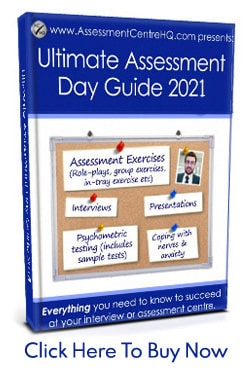QTS Literacy Skills Test Guide
In this success guide for the QTS literacy skills test we’ll tell you what to expect and how to succeed, step-by-step. Let’s get stuck in!

Table of Contents
3 useful starting-point resources
- If there is a ‘secret’ to passing the QTS literacy skills test, it is simply lots and lots of practice. There’s no short cuts. (Sadly!) You can get hold of practice QTS literacy tests here.
- You should definitely check out our verbal reasoning guide. It will be a treasure trove for you in preparing for your QTS literacy skills test.
- You can find our success guide for the QTS numeracy skills test here.
Download our Ultimate Assessment Day & Interview Guide 2022 here. (It's packed with tips, tricks and insider-secrets to help you succeed.)
What’s in this literacy skills test guide?
In this guide we’ll share the hints, top tips and secrets that you need to know to pass your professional skills test. Basically, all the essential knowledge that you need to pass the test is included here on this page.
We’ll briefly look at the basics of the test and then we’ll get into the specific details of how to pass it.
What is the literacy skills test?
The literacy skills test is a key part of the QTS professional skills tests. It’s not an assessment of your teaching knowledge or any specialised subject. It purely assesses a general skill that’s required to competently fulfill the role. And of course, that skill is literacy; your ability to understand and interpret written data.
Useful literacy skills test video
This video from the University of Cumbria will give you a fast overview.
Why is the literacy skills test important?
The literacy skills test must be passed to gain Qualified Teacher status. (You can’t be a teacher in the UK unless you pass this test.) It is also a part of recruitment process of various organisations. For example, NHS takes literacy & numeracy tests for recruiting healthcare assistants.
Where will I take my literacy skills test?
You’ll sit your literacy skills test at a Learn Direct centre. You can find your nearest centre here.(Before you can book your literacy skills test you’ll need to register and you can do that here.)
How long does the test take?
You’ll be at the test centre for around 90 minutes.
What should I expect in my literacy skills test?
Ok, we’ve covered the broad basics. Let’s get into the detail of the test.

- Spelling
- Punctuation
- Grammar
- Comprehension
Let’s take a closer look at each section.
Spelling
This is the first section of your literacy skills test. Important point: You can’t go back and review or change your answers later. (So make sure you get it right first time.)
You will be provided with a set of headphones for this section. Listen to your questions carefully and choose the correct spelling on screen.
Here’s a video with some useful suggestions:
Thankfully, the words you will be asked to spell are relevant to the teaching world. (Don’t worry, you won’t be asked to spell any strange technical terms or scientific Latin names!)
There are 10 marks at stake in this section.
TOP TIP: One of the best ways to improve your spelling it to ‘actively read’. Active reading is when you scrutinise each word as you read it, rather than skimming through a body of writing and letting the words ‘wash over you’. It takes concentration at first, but it’s an acquired skill that gets easier over time and works wonders in terms of improving your vocabulary. Practice it today. Buy a broadsheet newspaper and give it a try.
Spelling Test
Ok, time for some activity!
1) Visit this Oxford Online Dictionary page which includes a long list of commonly misspelled words.
2) Print the page off and hand it to a friend. Ask them to read the words aloud while you have a stab at spelling them.
3) At the end of test, check which words you misspelled. Collate them into a single list.
4) Write the words correctly 20 times each. It’s boring, but it works. We’re going to repeat that. It’s boring, but it works.
Punctuation

You won’t have to write the actual paragraph or add/remove any of the sentences. You just have to make sure the punctuation is correct.
Can you spot incorrect punctuation? Can you see where a comma or full stop is needed? Do you understand how colons, semi-colons and apostrophes should be used?
This page from Oxford online dictionaries is insanely useful; it’s concise and filled with wisdom. You now have no excuse for not learning how to use these basic punctuation tools! 🙂
Over-punctuation in the literacy skills test
There’s a good chance that you will over-punctuate during this part of the literacy skills test. Don’t worry about this too much.
- You won’t get extra marks for ‘extra’ (non-essential) punctuation. So don’t be tempted to take a machine gun approach and spray commas all over the page.
- As long as your punctuation is acceptable, even if it’s not a necessity, you won’t be marked down for it.
You can get hold of practice QTS literacy tests here.
Download this useful tool now
Download your copy of our popular report: The 4-Steps To Literacy & Verbal Reasoning Test Success
Useful punctuation videos
Check out this video for punctuation rules. This lady might not be the most incredible presenter but the information is all good. Stick with it!
This is another useful video, covering comma use.
Grammar
There are 10 to 12 marks available for this section (depending on the version of the test that you sit).
Firstly, let’s be clear as to what is being asked of you in this section.
You will not be assessed on your knowledge of grammatical terms. This part of the literacy skills test assesses your knowledge on the usage of grammar.
Can you recognise poor grammar? We hope so. You need to be able to tell the difference between a sentence that makes grammatical sense and one that does not. You will edit complete passages of text and you must select and insert the correct choice (ie, pick an option that ensures the passage makes grammatical sense).

Comprehension
This is the final part of the literacy skills test and it carries 10-12 marks.
You will be assessed on your ability to understand, examine and analyse a selection of written text examples. The examples will be texts that you would come across, in the role of a teacher – perhaps an educational press document or a piece of government information.
This video covers the basics of reading comprehension. It’s worth a quick look.
The following skills are being assessed here:
- Can you identify the most important points in the text/article?
- Can you draw the correct conclusions and make accurate deductions?
- Can you ‘fish out’ the the main facts or key points?
- Are you able to tell the difference between fact and opinion?
- Can you digest and then summarise the information, in your own words?
This is an easy one to practice and, thankfully, comprehension tests are something you can quickly become better at. Outside of the teaching sphere these tests are referred to as ‘verbal reasoning tests’ and they are used by all big employers in the UK now.
Nothing will boost your ability in this area more than practice. We always recommend these tests to people who want to prepare for their literacy skills test as they include explanations for each question. This is huge, because it allows you see where you went wrong and then plug that hole in your knowledge. There is no better way to boost your chances of success.
TOP TIP: Make sure you check out our verbal reasoning guide. It’s filled with advice that will transform your chances of success.
When will I find out my score?
Almost immediately. The great thing about the literacy skills assessment is there is no painful wait for results. The literacy skills assessment/test is computer-marked so you will be given a scorecard as soon as you’ve completed all sections of the test.
You will need a total of 29 or more to pass your literacy skills test.
There is no certification for this test so don’t throw away your score card. (The score card is all you will receive, so keep it for your future records.)
2 Essential Tips For Literacy Skills Test Preparation
- Read – Read, read, read. The better the reader, the better the literacy skills. Practice ‘active reading’ every day for 30 minutes before your literacy skills assessment.
- Brush up on your grammar and punctuation – Go through the exercises above, read the resource pages, watch the videos and take the practice tests. You will quickly identify where you need to improve.
Download this useful tool before you leave!
Download your copy of our popular report: The 4-Steps To Literacy & Verbal Reasoning Test Success.
4 Useful Literacy Skills Test Resources
Here’s a few useful links from around the web that will help you pass your literacy skills examination.
- Official Department for Education professional skills test page.
- This book has some fabulous reviews: “Passing the Literacy Skills Test“.
- If you found this guide useful, check out our numerical skills test guide.
- Here’s a literacy skills practice test: click here.
Thanks for reading!
We hope you enjoyed this free guide? If so, please share it on Facebook, thanks! 🙂
Turbocharge your employability NOW
Get your copy of our Ultimate Assessment Day & Interview Guide here. It's packed with tips, tricks and insider-secrets to help you succeed.
.
© Copyright AssessmentCentreHQ - All Rights Reserved
.
FAQs
1. What is the pass mark for QTS literacy skills test?
We’ve helped a lot of people pass their qts literacy skills test, and we’ve found that 65% is a fair target. People who score 70% or higher on our tests almost invariably pass their first attempt.
2. How do I prepare for QTS skills test?
The QTS skills test is an assessment that measures your ability to use the skills and knowledge required to teach in school. There is no one-size-fits-all answer to this question, as the best way to prepare for the test will vary depending on your individual strengths and weaknesses. However, some tips that may help include studying the relevant curriculum content, practicing teaching activities, and working on your problem-solving skills.
3. Can you get QTS without a degree?
Yes, you can get QTS without a degree. However, you will need to have completed an initial teacher training course.
4. Is QTS or PGCE better?
There is no simple answer to this question as it depends on individual circumstances. Generally, QTS is seen as being more vocational, while PGCE is seen as being more academic. However, both qualifications offer a good level of training and are recognised by schools across the country.
5. How long does a QTS last for?
A QTS (Qualified Teacher Status) is valid for 5 years.
Sarah is an accomplished educator, researcher and author in the field of testing and assessment. She has worked with various educational institutions and organisations to develop innovative evaluation methods and enhance student learning. Sarah has published numerous articles and books on assessment and learning. Her passion for promoting equity and fairness in the education system fuels her commitment to sharing insights and best practices with educators and policymakers around the world.






